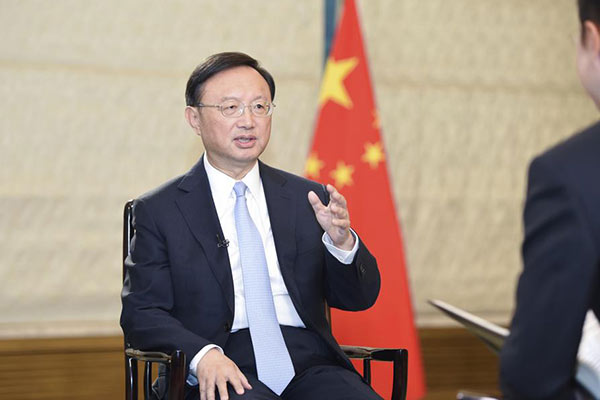
‘We cannot lose one centimeter of inheritance left by the ancestors,’ nation’s top diplomat says
China said on July 14 that it will respond resolutely if any party seeks to use the ruling in the unilaterally initiated arbitration on the South China Sea to harm China’s interests.
State Councilor Yang Jiechi said he expected the new Philippine government to properly handle the issue to “start a bright future for bilateral ties”.
“The sovereignty issue is China’s bottom line,” Yang, China’s top diplomat, said in an interview with Chinese media on the ruling.
“Though China is large, we cannot lose one centimeter of inheritance left by the ancestors,” Yang said.
He added that China is willing to discuss temporary arrangements with other countries involved on partnerships for development in the sea.
The ruling, issued after an arbitration process that was unilaterally initiated by the government of former Philippines president Benigno Aquino, will not influence China’s policy, Foreign Ministry spokesman Lu Kang told a regular news briefing.
“We want to stress that if anyone wants to use the ruling to take any action that provokes China’s interests, the Chinese side will definitely respond resolutely,” he said.
The Philippine Foreign Ministry said in a statement on July 14 that its foreign secretary, Perfecto Yasay, would raise the issue at the 11th Asia-Europe Meeting summit, to be held on July 15 and July 16 in Ulaanbaatar, the capital of Mongolia.
Premier Li Keqiang will attend the meeting.
The Philippines’ statement, which said the decision by the Arbitral Tribunal at The Hague should be respected, was the strongest yet from Manila on the ruling.
Assistant Foreign Minister Kong Xuanyou said on July 11 that the ASEM summit was “not an appropriate venue” to discuss the South China Sea.
During the news conference on July 14, Foreign Ministry spokesman Lu also said he was “a bit shocked” at the comments of Australian Foreign Minister Julie Bishop, who said on July 13 that it “would be a serious international transgression” if China ignores the arbitral ruling.
Lu said China had formally protested Australia’s “wrong remarks”, and China hopes Australia will not harm regional peace and stability.
“We hope that Australia can be more serious about international law and not treat it as a game,” Lu added.
On July 13, the Philippine Coast Guard conducted a joint maritime exercise with the Japan Coast Guard in the vicinity of Manila Bay, deploying vessels including an oil tanker, a rigid hull inflatable boat and a helicopter to carry out drills, the Spanish news agency EFE reported.
Observers from Malaysia, Australia and the United States were present at the exercise, which the Philippine Information Agency said was focused on combating piracy and armed robbery at sea and aimed to boost the capabilities of the coast guards of the Philippines and Japan.
Meanwhile, China welcomes the new Philippine government’s willingness to restart dialogue, Lu said. He added that the two countries have made contact through diplomatic channels since Rodrigo Duterte became the Philippines’ president last month.
Duterte has not made a statement since the tribunal announced its ruling on July 12.
Yin Zhuo, director of the Navy’s Expert Consultation Committee of the People’s Liberation Army, said that the tension in the South China Sea could escalate if the Philippines and other countries, including the US, continue to provoke China in the region.
